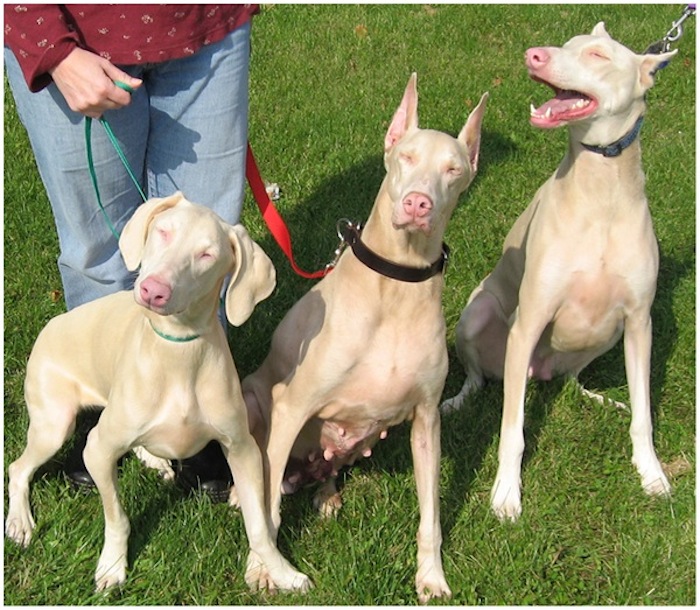Human 'Albino' Gene Found in Dogs

Get the world’s most fascinating discoveries delivered straight to your inbox.
You are now subscribed
Your newsletter sign-up was successful
Want to add more newsletters?

Delivered Daily
Daily Newsletter
Sign up for the latest discoveries, groundbreaking research and fascinating breakthroughs that impact you and the wider world direct to your inbox.

Once a week
Life's Little Mysteries
Feed your curiosity with an exclusive mystery every week, solved with science and delivered direct to your inbox before it's seen anywhere else.

Once a week
How It Works
Sign up to our free science & technology newsletter for your weekly fix of fascinating articles, quick quizzes, amazing images, and more

Delivered daily
Space.com Newsletter
Breaking space news, the latest updates on rocket launches, skywatching events and more!

Once a month
Watch This Space
Sign up to our monthly entertainment newsletter to keep up with all our coverage of the latest sci-fi and space movies, tv shows, games and books.

Once a week
Night Sky This Week
Discover this week's must-see night sky events, moon phases, and stunning astrophotos. Sign up for our skywatching newsletter and explore the universe with us!
Join the club
Get full access to premium articles, exclusive features and a growing list of member rewards.
Dogs and people have more in common than a love of Frisbees and long walks on the beach. A new study finds that certain dogs, just like certain humans, carry a gene mutation that causes albinism — a condition that results in little or no pigment in the eyes, skin and hair.
The study by researchers at Michigan State University identifies the exact genetic mutation that leads to albinism in Doberman pinschers, a discovery that has eluded veterinarians and dog breeders until now. Interestingly, the same mutated gene that causes albinism in this dog breed is also associated with a form of albinism in humans.
"What we found was a gene mutation that results in a missing protein necessary for cells to be pigmented," study co-author Paige Winkler, a doctoral student in the College of Veterinary Medicine at Michigan State University in East Lansing, Michigan, said in a statement. [The Pink and White Album: Amazing Albino Animals]
Winkler said the gene mutation found in Doberman pinschers is responsible for a condition known as oculocutaneous albinism, which also affects humans. The condition expresses certain characteristics in both humans and dogs.
"With an albino Doberman, you see a white or lighter-colored coat, pink noses and lips, along with pale irises in the eyes," Winkler said. "These traits are very similar to the characteristics humans display with this particular condition, causing light-pigmented skin and hair, along with eye discoloration and vision disturbances."
Just as people with this type of albinism experience skin sensitivity to sunlight, which can result in an increased vulnerability to skin tumors, canines with the mutated gene were also found to be at higher risk for developing skin tumors, the researchers said.
"We knew that albino Dobermans typically developed these types of tumors, much like [albino] humans, but we wondered what the actual increase in prevalence was between a 'white' dog and a regular-colored Doberman," said Joshua Bartoe, an assistant professor in the Department of Small Animal Clinical Sciences at Michigan State University, who co-led the study. "What we found was a significant increase in risk for development of melanoma-like tumors in the albino dogs."
Get the world’s most fascinating discoveries delivered straight to your inbox.
These findings were based on a study of 40 Dobermans pinschers — 20 albino dogs and 20 "regular-colored" dogs. The researchers found that more than half of the albino dogs had at least one tumor, while only one of the regular-colored dogs had a tumor.
Bartoe and Winkler said their study could serve as a valuable resource for Doberman breeders around the world, particularly because the American Kennel Club, a registry of purebred dog pedigrees in the United States, doesn't allow the registration of albino dogs.
"Because Dobermans can carry the defective gene, but show no signs of the [condition], this has posed serious problems among breeders," Bartoe said. "But now that we've identified the mutation, we can look at the genetic makeup of these dogs and determine if they might be carriers."
The results of the new study were published March 19 in the journal PLOS ONE.
Follow Elizabeth Palermo on Twitter @techEpalermo, Facebook or Google+. Follow Live Science @livescience, Facebook & Google+. Original article on Live Science.
 Live Science Plus
Live Science Plus










